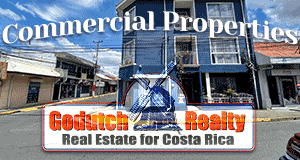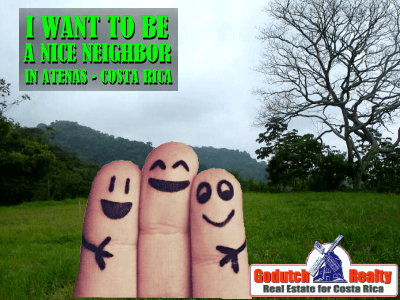 I own a building lot in an Atenas gated community and I want to be a good neighbor.
I own a building lot in an Atenas gated community and I want to be a good neighbor.
The months of December, January, and February are famous for the strong winds in Costa Rica. They mean the change from the rainy season to the dry season.
These 62 mph (100kph) winds can become pretty dangerous. Wildfires or brush fire is quite common in underpopulated areas such as certain communities in Atenas.
During the 2006 – 2008 real estate boo , a good deal of agricultural communities were created in Costa Rica, for several reasons.
The red tape to get permits to develop a condominium takes years, so some developers figured out that sub-dividing home lots in areas zoned for agriculture was a great idea. Especially because those areas offered some incredible views. Atenas was one of them.
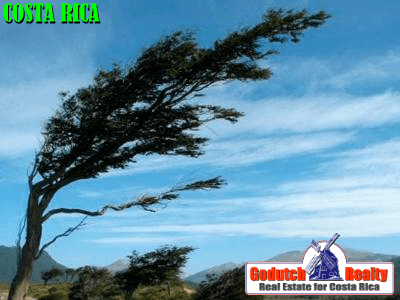
Agricultural lots
The law allows for a farm to be subdivided into 1 3/4 acre agricultural lots or “parcelas agrícolas”. Most developers called them a gated community. But most don’t have more than a gate in the front, which controls access due to the topography of the community. You’ll find these agricultural communities all over the country, especially in Atenas and in the coastal areas. The developers took advantage of the mountain ranges to obtain valley and ocean views.
It is important to know though, that such communities are nothing more than a subdivision of agricultural building lots. They are not legally constituted as a formal condominium. A legally formed condominium in Costa Rica has bylaws included in the constitution. Those bylaws are registered in the National Register. The agricultural subdivision doesn’t;t have any formal bylaws, because they’re not a condominium even though some call them that.
Needs for rules and regulations
When you purchase a property in a community, you assume that you can live in that community in peace. You expect your neighbors to do the same. Unfortunately, as a society, we need rules and regulations to be able to live together in peace.
Many agricultural communities have created bylaws that are not registered in the National Registry, just so the neighbors have rules and regulations to live by. This is great and very necessary. Of course, if I would live there, I would like my neighbors to take well care of the maintenance of their property and live in a beautiful and safe environment.
HOA fees, how do they work?
I have been a real estate broker in Costa Rica for many years and I know an incredible amount of communities. Some are legally condominiums and some are not. In those that are not condominiums, there are no rules, no bylaws, and no laws that indicate that a property needs to be maintained. Which is how it is when you own a property that is not in a community.
HOA fees are legally constituted in the bylaws and they are used to cover all common expenses necessary to maintain the quality of the community.
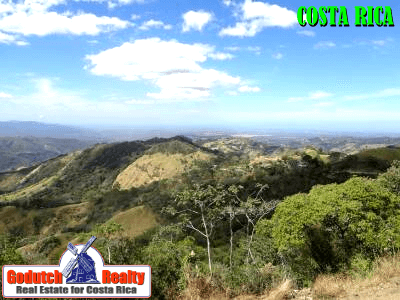
In most condominiums, there is an obligation to maintain a lot, for the safety of the neighbors. And also to assure the stable value of all the properties in the community. The bylaws allow for a fine for not maintaining your property.
Usually, homeowners pay a much higher fee than lot owners, just like we do too in our community. The reason is very simple: the lot owners do not use any of the amenities and infrastructure daily, while the homeowners do.
Back to the wildfires
Last year, half of this Atenas community where I own a building lot, was totally overgrown. That’s because nobody cleans his lot (I didn’t either, shame on me) and one of the houses burned down. We were lucky it didn’t cost any lives.
The biggest problem is that a majority of property owners in these communities live out of the country. Many have their lot as an investment or to build years later, so lots are overgrown most of the time.
The fire happened last year because human nature is like that I guess. We just wait until it is too late. The community didn’t get organized last year. This year, a couple of days ago (it’s January now), my neighbors asked me to clean my building lot because the winds are a danger for wildfires.
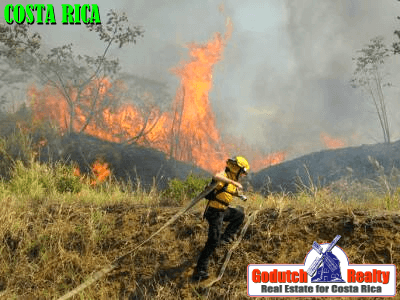
The Result
The result is that I will of course cooperate, as every neighbor should. I don’t want my neighbors to get killed in a wildfire or lose their house with everything in it. I want my property in Atenas to keep its value and one day either build on it or sell it.
Nonetheless, if I clean my lot and several other neighbors don’t, it’ll be all a waste of money and effort. Besides, I live in Escazu. I don’t have the time to look for a gardener and make sure he does his job. I don’t want to stick the problem to my neighbors either.
The Solution
The solution is simple; there is no need to reinvent the wheel. We have 2 options:
1. All homeowners pay 100% of the HOA fees and the owners of the empty building lots in the community pay 75%. The HOA admin will maintain all the empty lots, just like they do with the common areas (roads and gutters). This way, the homeowners will be assured of living in a nice and safe community all year round. And nobody has to worry about their bad neighbors who don’t clean their lot.
2. Homeowners pay 100% of the HOA fees and lot owners pay 50%. Lot owners will be obliged to clean their lot every quarter. Unfortunately, it is very difficult to legally oblige lot owners to pay, because there are no legal bylaws. So in my opinion, solution one is so much better.
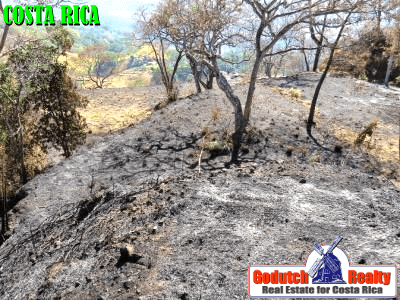
I am perfectly willing to cooperate in paying my share in keeping the community safe. But how do I find a gardener who will clean my building lot in such a way that it will make my neighbors happy?
I hope they understand that there is NO reason for any neighbor to clean their lot periodically, except for wanting to be a reasonably good neighbor.
If you like this blog, subscribe to my newsletter by clicking the banner below.
I DO want to remind our readers that we appreciate any referrals you can send us. Also, please remember the GoDutch Realty agents when you talk about your home in Costa Rica, we appreciate it.










